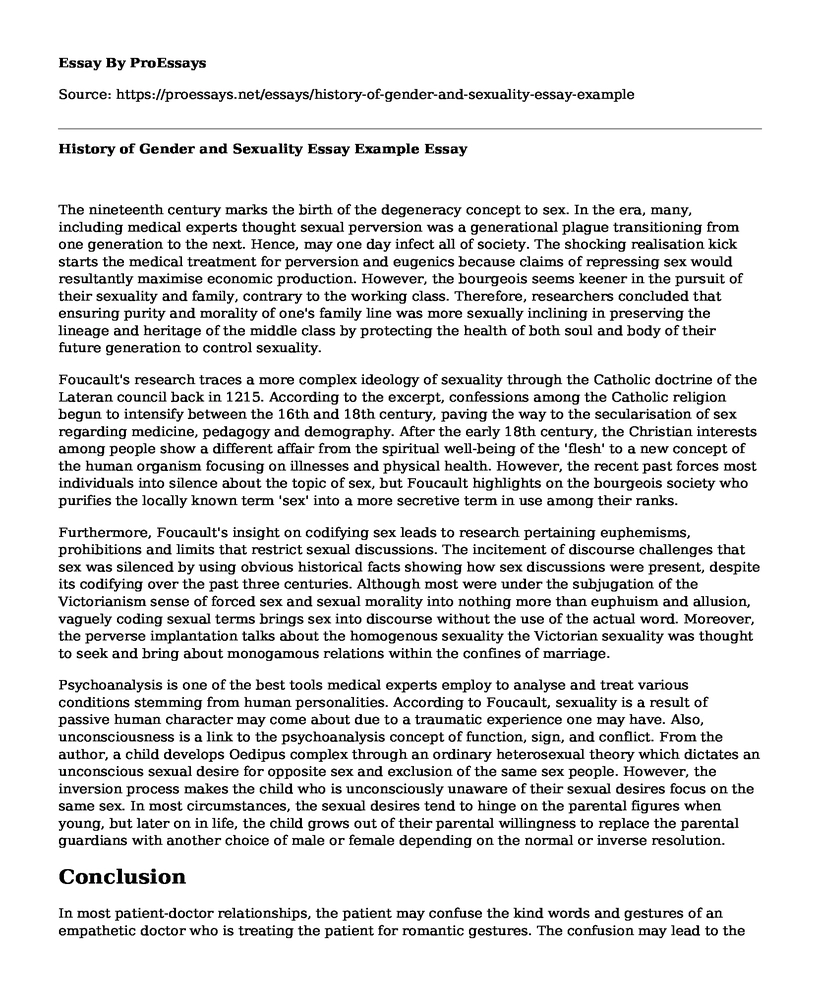The nineteenth century marks the birth of the degeneracy concept to sex. In the era, many, including medical experts thought sexual perversion was a generational plague transitioning from one generation to the next. Hence, may one day infect all of society. The shocking realisation kick starts the medical treatment for perversion and eugenics because claims of repressing sex would resultantly maximise economic production. However, the bourgeois seems keener in the pursuit of their sexuality and family, contrary to the working class. Therefore, researchers concluded that ensuring purity and morality of one's family line was more sexually inclining in preserving the lineage and heritage of the middle class by protecting the health of both soul and body of their future generation to control sexuality.
Foucault's research traces a more complex ideology of sexuality through the Catholic doctrine of the Lateran council back in 1215. According to the excerpt, confessions among the Catholic religion begun to intensify between the 16th and 18th century, paving the way to the secularisation of sex regarding medicine, pedagogy and demography. After the early 18th century, the Christian interests among people show a different affair from the spiritual well-being of the 'flesh' to a new concept of the human organism focusing on illnesses and physical health. However, the recent past forces most individuals into silence about the topic of sex, but Foucault highlights on the bourgeois society who purifies the locally known term 'sex' into a more secretive term in use among their ranks.
Furthermore, Foucault's insight on codifying sex leads to research pertaining euphemisms, prohibitions and limits that restrict sexual discussions. The incitement of discourse challenges that sex was silenced by using obvious historical facts showing how sex discussions were present, despite its codifying over the past three centuries. Although most were under the subjugation of the Victorianism sense of forced sex and sexual morality into nothing more than euphuism and allusion, vaguely coding sexual terms brings sex into discourse without the use of the actual word. Moreover, the perverse implantation talks about the homogenous sexuality the Victorian sexuality was thought to seek and bring about monogamous relations within the confines of marriage.
Psychoanalysis is one of the best tools medical experts employ to analyse and treat various conditions stemming from human personalities. According to Foucault, sexuality is a result of passive human character may come about due to a traumatic experience one may have. Also, unconsciousness is a link to the psychoanalysis concept of function, sign, and conflict. From the author, a child develops Oedipus complex through an ordinary heterosexual theory which dictates an unconscious sexual desire for opposite sex and exclusion of the same sex people. However, the inversion process makes the child who is unconsciously unaware of their sexual desires focus on the same sex. In most circumstances, the sexual desires tend to hinge on the parental figures when young, but later on in life, the child grows out of their parental willingness to replace the parental guardians with another choice of male or female depending on the normal or inverse resolution.
Conclusion
In most patient-doctor relationships, the patient may confuse the kind words and gestures of an empathetic doctor who is treating the patient for romantic gestures. The confusion may lead to the patient seeking more than health care from a doctor due to the pain and relief difference. However, most cases result in implantation of perverse thoughts because of the close relations medical personnel may have on the patient. In retrospect, medical discourse is the cause of embracing inversion traits including transsexuality and homosexuality due to the perspective of health or sickness in medical terms. Contrary to the Christian view of sinful or moral behaviours, scientific study in the 18th and 19th centuries helps to break barriers associating the inverse traits as diseases that are curable.
Cite this page
History of Gender and Sexuality Essay Example. (2022, May 26). Retrieved from https://proessays.net/essays/history-of-gender-and-sexuality-essay-example
If you are the original author of this essay and no longer wish to have it published on the ProEssays website, please click below to request its removal:
- Essay Example on Social Media: Positive & Negative Impacts on Society
- Same-Sex Marriage: An Overview of Legalization and Social Reactions - Essay Sample
- Essay on Parent-Child Interaction: Key to Child's Development
- Learn How To Communicate Effectively: Essay Sample on The Power of Communication Style
- Article Analysis Essay on Community Mental Health Policy in America: Lessons Learned
- Black Women Leaders: Examining Empowerment Through Q-Sort Methodology - Essay Sample
- Essay Sample on Cultural Diversity in Counseling: Impact on Client-Counselor Relationships







